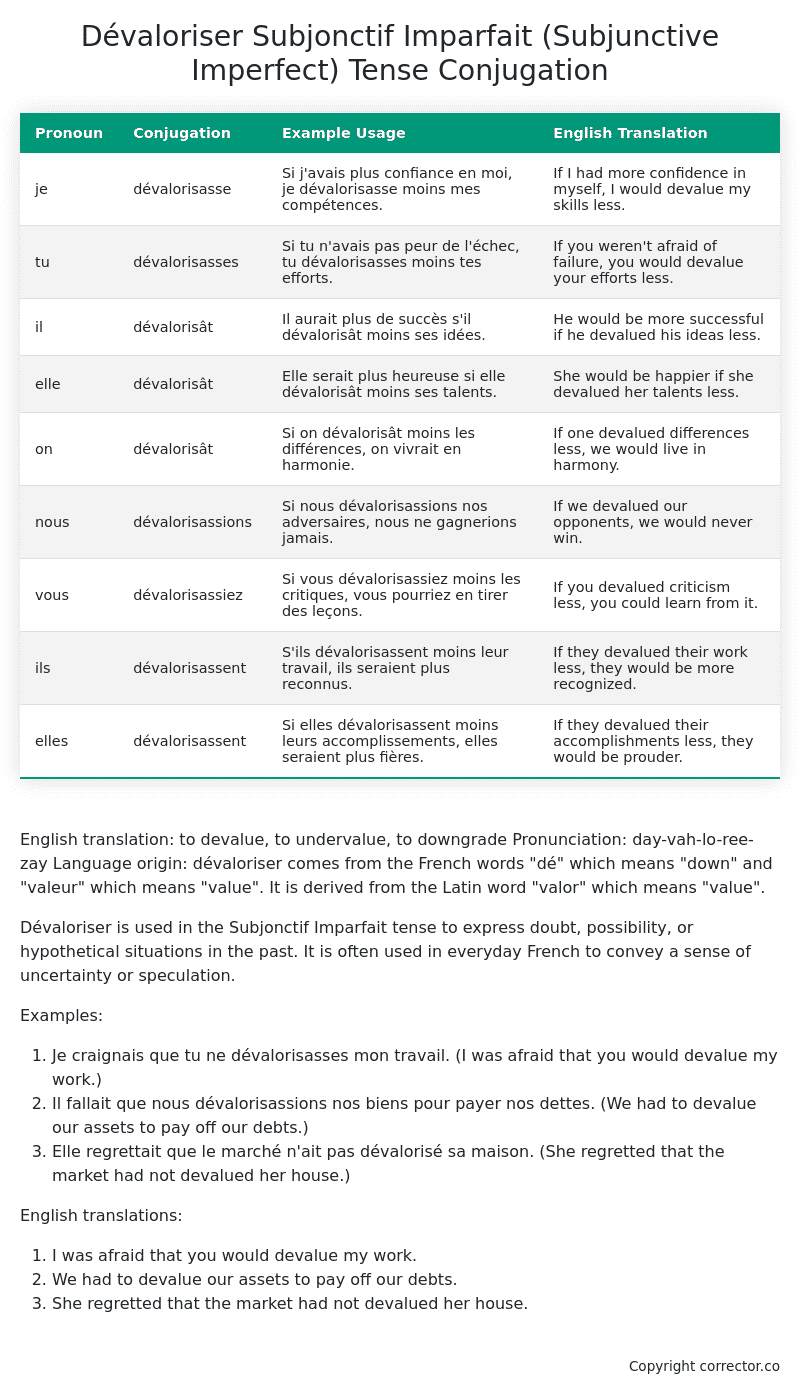Subjonctif Imparfait (Subjunctive Imperfect) Tense Conjugation of the French Verb dévaloriser
Introduction to the verb dévaloriser
English translation: to devalue, to undervalue, to downgrade
Pronunciation: day-vah-lo-ree-zay
Language origin: dévaloriser comes from the French words “dé” which means “down” and “valeur” which means “value”. It is derived from the Latin word “valor” which means “value”.
Dévaloriser is used in the Subjonctif Imparfait tense to express doubt, possibility, or hypothetical situations in the past. It is often used in everyday French to convey a sense of uncertainty or speculation.
Examples:
- Je craignais que tu ne dévalorisasses mon travail. (I was afraid that you would devalue my work.)
- Il fallait que nous dévalorisassions nos biens pour payer nos dettes. (We had to devalue our assets to pay off our debts.)
- Elle regrettait que le marché n’ait pas dévalorisé sa maison. (She regretted that the market had not devalued her house.)
English translations:
- I was afraid that you would devalue my work.
- We had to devalue our assets to pay off our debts.
- She regretted that the market had not devalued her house.
Table of the Subjonctif Imparfait (Subjunctive Imperfect) Tense Conjugation of dévaloriser
| Pronoun | Conjugation | Example Usage | English Translation |
|---|---|---|---|
| je | dévalorisasse | Si j’avais plus confiance en moi, je dévalorisasse moins mes compétences. | If I had more confidence in myself, I would devalue my skills less. |
| tu | dévalorisasses | Si tu n’avais pas peur de l’échec, tu dévalorisasses moins tes efforts. | If you weren’t afraid of failure, you would devalue your efforts less. |
| il | dévalorisât | Il aurait plus de succès s’il dévalorisât moins ses idées. | He would be more successful if he devalued his ideas less. |
| elle | dévalorisât | Elle serait plus heureuse si elle dévalorisât moins ses talents. | She would be happier if she devalued her talents less. |
| on | dévalorisât | Si on dévalorisât moins les différences, on vivrait en harmonie. | If one devalued differences less, we would live in harmony. |
| nous | dévalorisassions | Si nous dévalorisassions nos adversaires, nous ne gagnerions jamais. | If we devalued our opponents, we would never win. |
| vous | dévalorisassiez | Si vous dévalorisassiez moins les critiques, vous pourriez en tirer des leçons. | If you devalued criticism less, you could learn from it. |
| ils | dévalorisassent | S’ils dévalorisassent moins leur travail, ils seraient plus reconnus. | If they devalued their work less, they would be more recognized. |
| elles | dévalorisassent | Si elles dévalorisassent moins leurs accomplissements, elles seraient plus fières. | If they devalued their accomplishments less, they would be prouder. |
Other Conjugations for Dévaloriser.
Le Present (Present Tense) Conjugation of the French Verb dévaloriser
Imparfait (Imperfect) Tense Conjugation of the French Verb dévaloriser
Passé Simple (Simple Past) Tense Conjugation of the French Verb dévaloriser
Passé Composé (Present Perfect) Tense Conjugation of the French Verb dévaloriser
Futur Simple (Simple Future) Tense Conjugation of the French Verb dévaloriser
Futur Proche (Near Future) Tense Conjugation of the French Verb dévaloriser
Plus-que-parfait (Pluperfect) Tense Conjugation of the French Verb dévaloriser
Passé Antérieur (Past Anterior) Tense Conjugation of the French Verb dévaloriser
Futur Antérieur (Future Anterior) Tense Conjugation of the French Verb dévaloriser
Subjonctif Présent (Subjunctive Present) Tense Conjugation of the French Verb dévaloriser
Subjonctif Passé (Subjunctive Past) Tense Conjugation of the French Verb dévaloriser
Subjonctif Imparfait (Subjunctive Imperfect) Tense Conjugation of the French Verb dévaloriser (this article)
Conditionnel Présent (Conditional Present) Tense Conjugation of the French Verb dévaloriser
Conditionnel Passé (Conditional Past) Tense Conjugation of the French Verb dévaloriser
L’impératif Présent (Imperative Present) Tense Conjugation of the French Verb dévaloriser
L’infinitif Présent (Infinitive Present) Tense Conjugation of the French Verb dévaloriser
Struggling with French verbs or the language in general? Why not use our free French Grammar Checker – no registration required!
Get a FREE Download Study Sheet of this Conjugation 🔥
Simply right click the image below, click “save image” and get your free reference for the dévaloriser Subjonctif Imparfait tense conjugation!

Dévaloriser – About the French Subjonctif Imparfait (Subjunctive Imperfect) Tense
Formation
Common Everyday Usage Patterns
Interactions with Other Tenses
Subjonctif Présent
Indicatif Passé Composé
Conditional
Conditional Perfect
Summary
I hope you enjoyed this article on the verb dévaloriser. Still in a learning mood? Check out another TOTALLY random French verb conjugation!


